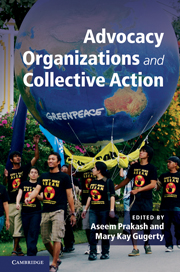Book contents
- Frontmatter
- Contents
- Figures and tables
- Contributors
- Preface
- Acknowledgments
- 1 Advocacy organizations and collective action
- Part 1 The institutional environment and advocacy organizations
- Part 2 Advocacy tactics and strategies
- Part 3 International advocacy and market structures
- 8 The political economy of transnational action among international NGOs
- 9 Advocacy organizations, networks, and the firm analogy
- 10 Shaping civic advocacy
- Part 4 Toward a new research program
- Index
10 - Shaping civic advocacy
international and domestic policies toward Russia’s NGO sector
Published online by Cambridge University Press: 05 June 2012
- Frontmatter
- Contents
- Figures and tables
- Contributors
- Preface
- Acknowledgments
- 1 Advocacy organizations and collective action
- Part 1 The institutional environment and advocacy organizations
- Part 2 Advocacy tactics and strategies
- Part 3 International advocacy and market structures
- 8 The political economy of transnational action among international NGOs
- 9 Advocacy organizations, networks, and the firm analogy
- 10 Shaping civic advocacy
- Part 4 Toward a new research program
- Index
Summary
In the past few decades, advocacy organizations have grown in number and variety in virtually every region of the world, creating what some have termed a “global associational revolution”; a development, they argue, which may match the significance of the rise of the nation-state in the late nineteenth and early twentieth centuries (Salamon, Sokolowski, and List, 2003). This expansion has been mirrored by an increased scholarly interest in understanding more clearly what has contributed to the emergence, structure, and impact of this sector. In particular, a collective action approach, which assumes that advocacy NGOs, like firms, can be viewed as instrumental actors pursuing policy goals in policy markets (Prakash and Gugerty, this volume), highlights the ways in which institutional context, at both the domestic and international levels, can affect the supply and demand for advocacy. Domestic factors, such as the legal environment, levels of organizational capacity, financial viability, and infrastructural support, as well as larger socio-economic and political contexts can stimulate or dampen domestic demand for advocacy organizations, as well as raise or lower the costs of advocacy provision. In particular, as Bloodgood (this volume) notes, governments can dramatically shape the costs of advocacy, through the passage of a wide array of permissive and/or constricting regulations, the establishment of policy machinery that grants access to advocacy organizations, and the provision of funding. In addition, the international context has also become an important variable; since the 1980s, bilateral and multilateral development agencies, as well as various private foundations, have become actively involved in providing technical and financial assistance to advocacy organizations in primarily developing and democratizing regions of the world, in the hopes of strengthening the nonprofit sector, and by extension, civil society, and often, ultimately, democracy. These actors have also had a substantial impact on the supply and demand of advocacy by privileging (through funding and other forms of technical assistance) some advocacy themes over others and supporting advocacy organizations that may not have survived on domestic demand alone. In sum, governments and international donors both act as critical advocacy NGO principals in that they both provide resources for and impose costs on actors in the advocacy industry.
- Type
- Chapter
- Information
- Advocacy Organizations and Collective Action , pp. 252 - 280Publisher: Cambridge University PressPrint publication year: 2010
- 10
- Cited by



